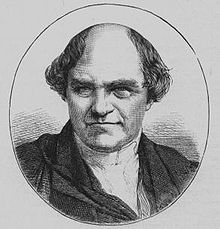- William Whewell
-
William Whewell (24 de mayo de 1794 - 6 de marzo de 1866). Teólogo, filósofo y científico británico. Y al mismo tiempo conocido por emplear el término "científico" en vez de "filósofo natural".
Contenido
Filosofía e Historia de la Ciencia
William Whewell es especialmente conocido por su investigación en el campo de la historia de la ciencia (History of the Inductive Sciences, 1837) y la filosofía de la ciencia (Philosophy of the Inductive Sciences, 1840).
Desde una óptica neokantiana y tomando como modelo a la física newtoniana, Whewell considera que el método científico se sustenta en la "confluencia de inducciones". El avance del conocimiento científico depende de la adecuación progresiva entre los hechos y las ideas que los ponen en conexión. Las ideas, para Whewell, son los conceptos genéricos de espacio, tiempo y causa y otros propios de algunas ciencias: "afinidad electiva" en química, "fuerza vital" en biología y "tipo natural" en taxonomía).
En economía fue partidario de la escuela historicista que basaba sus conocimientos en los métodos inductivos de bacon contrarios al tradicional utilitarismo de Bentham que consideraba deductivo. Fue amigo de Richard Jones y tras su muerte, le reúne y publica un cierto número de obras menores bajo el título de "Reliquias literarias".
Geología y Teoría evolutiva
En Geología, Whewell se opuso al actualismo de Charles Lyell y defendió la actuación de causas sobrenaturales en la historia de la tierra para explicar los vacíos del registro fósil.
Su concepción de la relación entre forma y función orgánica se correspondió con la teoría del diseño inteligente, a cuya divulgación colaboró activamente al ser elegido para la redacción de uno de los ocho Bridgewater Treatises.
Bibliografía
- (1837) History of the Inductive Sciences
- (1840) Philosophy of the Inductive Sciences
Referencias
- González Recio, José Luis, Teorías de la Vida, Ed. Síntesis. Madrid, 2004.
Enlaces externos
 Wikimedia Commons alberga contenido multimedia sobre William WhewellCommons.
Wikimedia Commons alberga contenido multimedia sobre William WhewellCommons.
Categorías:- Nacidos en 1794
- Fallecidos en 1866
- Medalla Royal
- Ciencia y religión
- Filósofos del Reino Unido
- Científicos del Reino Unido
- Economistas del Reino Unido
- Historiadores de la ciencia
- Filósofos de la ciencia
Wikimedia foundation. 2010.

